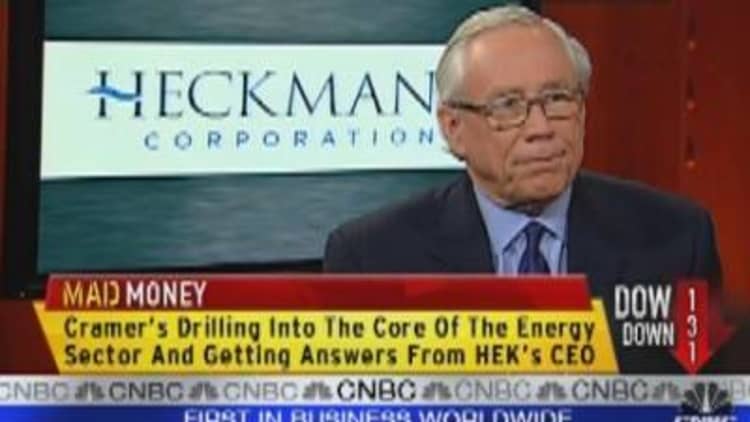
Days after the U.S. Environmental Protection Agency said fluids used to drill for natural gas likely polluted an aquifer in Wyoming, an industry leader on Wednesday suggested it maybe an isolated incident.
“It was just bad handling of the water at the surface. It has nothing to do with fracking,” said Heckmann Corp. CEO Dick Heckmann, who promoted hydraulic fracturing, or fracking, as way to boost U.S. gas and oil production and slash imports.
In fracking, drillers blast large amounts of water, chemicals and sand deep underground to crack rocks that hold the fuel. Industry groups have said that fracking has been used for decades without ever polluting water supplies, because the drilling occurs far below the water sources such as aquifers.
“You frack at 10,000 feet [underground and] water seeps down,” Heckmann explained. “It doesn’t seep up.”
The fracking process uses a lot of water, too. Heckmann said about 8,000 gallons are used in each well and afterward, all of that water has to come back up. Some of it can be reused, but most of it is too salty – roughly five times as salty as ocean water. Heckmann has pipeline and other equipment that disposes of the frac fluid and saltwater. It goes into disposal holes far underground and in places like Pennsylvania, where deep holes for disposal cannot be drilled, Heckmann said the water is coming to the surface in the middle of oilfields where it evaporates.
Heckmann also addressed concerns of a water shortage, arguing it’s nothing more than an “old wives’ tale.”
“There is no shortage of water. It is an allocation of water,” Heckmann explained, noting fracking uses about 1.4 percent of the water available, not including the oceans while farming uses 47 percent. “There is plenty of water … look around, there is water everywhere.”
Heckmann admitted there is a slight water shortage in the Eagle Ford shale of South Texas, but he pointed out that much of the water is recycled.
Read on for Cramer's Top Energy Plays
(RELATED—Wyoming Frack Storm Shows Need for Better Regulation: Kemp)
—Reuters contributed to this report
Call Cramer: 1-800-743-CNBC
Questions for Cramer?
Questions, comments, suggestions for the Mad Money website? madcap@cnbc.com



